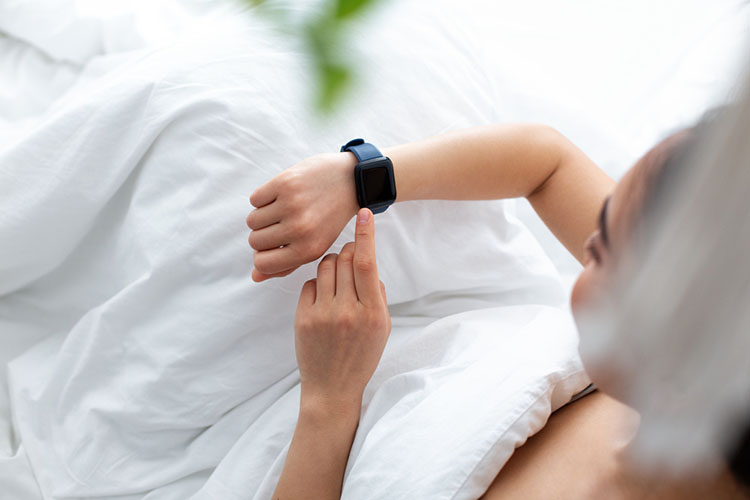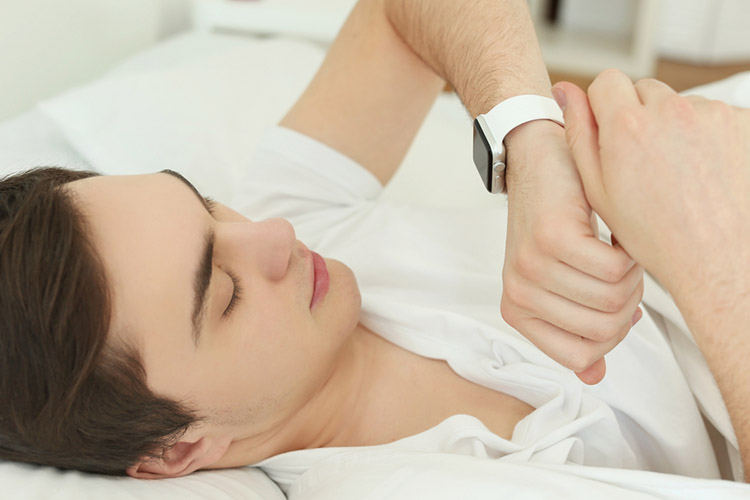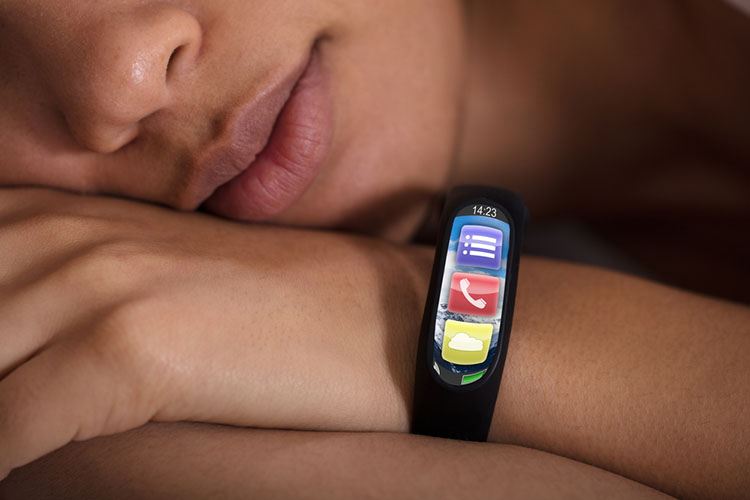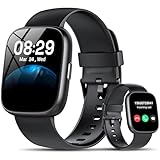Traditionally, just before you go to bed, you would take off your watch and place it on your nightstand or bedside table, but has this behavior changed?
The answer to the age old question, should I wear my watch to bed? Has become more complex in recent years due to the prevalence of smartwatches and features such as sleep tracking.
In this blog, we will be looking at if you should be sleeping in your watch, the benefits of wearing a Smartwatch to bed, and why you should not wear traditional or digital watches when you sleep.
Sleeping With a Smartwatch

As we all know, there has been a massive boom in the popularity of Smartwatches, creating a whole new lease of life on the watch industry as a whole.
With these improvements in technology have come a host of different features and uses for our watches, from fitness tracking to messaging, to sleep functions.
So, is it a good idea to sleep wearing your Smartwatch? Aren’t they designed to be worn at all times of the day? Well, we are going to look at a few of the reasons to sleep in your Smartwatch.
Reasons for Sleeping with a Smartwatch On
Sleep Tracking
![]()
Quite a few Smartwatches have a lot of different technology features that can help you determine how well you are sleeping and get a better read of how to improve your sleep.
They can be used to identify when you are in your deepest sleep and even help you set the right bedtime due to your sleeping habits.
They are specifically designed with this purpose in mind, so despite what people think are fine to wear to sleep, they will not harm you.
Alarm on Your Wrist

Depending on how deeply you sleep, this can be a really useful feature, everyone knows someone who sleeps through anything and needs multiple alarms to wake up.
Having a Smartwatch on your wrist when you are sleeping will mean you get the noise and vibration right next to you, making it much easier to wake up.
To put this into context, take, for example, the Apple Watch, which has a lot of different settings and customization. This makes it a market leader in the sleep watch industry.
Check the Time

This seems like a fairly obvious reason, but it is more important than you think. The majority of people charge their phone next to the bed and often look at it to check the time.
You might end up getting distracted by a message and then stay up for a few minutes replying or scrolling through your notifications.
There are two easy solutions to this, wear your Smartwatch to bed to quickly and easily check the time, and put your phone on airplane mode overnight to remove the temptation.
Sleeping With Traditional Watches
As we alluded to above, it is more usual to take off your traditional style watch when you are going to sleep.
As a rule of thumb, traditional and luxury watches are not designed to be worn when you are asleep, they are often bulkier and more intricate.
Aside from potentially damaging your watch, you will have a worse night’s sleep due to being uncomfortable, which will reduce your sleep quality and duration.
There are not really any benefits or reasons to wear your traditional style watch to bed, and with the lack of light or other features, it is unlikely you will need it for anything other than the time.
If this is the case get yourself a digital clock or something next to your bedside or within your direct view.
🏆 #1 Best Overall
- Get inspired and stay accountable with Versa 4 + Premium - learn when to work out or recover, see real-time stats during exercise and find new ways to keep your routine fresh and fun.Operating temperature: -14° to 113°F.
- Built for better fitness results: Daily Readiness Score(1), built-in GPS and workout intensity map, Active Zone Minutes, all-day activity tracking and 24/7 heart rate, 40+ exercise modes and automatic exercise tracking, water resistant to 50 meters
- Tools to measure and improve sleep quality: personalized Sleep Profile(1), daily sleep stages & Sleep Score, smart wake alarm and do not disturb mode
- Maintain a healthy body and mind: daily Stress Management Score, reflection logging, SpO2(2), health metrics dashboard(3), guided breathing sessions, menstrual health tracking and mindfulness content
- Designed for fitness & beyond: on-wrist Bluetooth calls, texts and phone notifications(4), customizable clock faces, Fitbit Pay(5), Amazon Alexa built-in(6), Google Wallet & Maps (Google Maps Android only, coming Spring 2023 to iOS), 6+ day battery(7)
Sleeping With Digital Watches
There is a slightly different argument to be made when you are wearing a digital watch to bed. It can be argued that the case for and against sleeping in a digital watch is not as black and white.
As there is normally some form of light or illumination on a digital watch, people are more inclined to wear these to bed.
With this being said, some studies show that watches are not advised to be worn to bed and can be detrimental to your health.
As with traditional style watches, there are not really any good reasons to wear your digital watch to sleep, and the drawbacks outweigh the benefits in a big way.
Reasons to Start Tracking Your Sleep
![]()
There are a few reasons why you might want to use this wearable technology to track your sleep, here are a handful of reasons people start tracking their sleep.
This is not a full list but gives you a rough idea of why people start sleep tracking via their Smartwatches and apps. Click here to read more about the tech behind how a smartwatch tracks sleep.
Rank #2
- WHY GALAXY WATCH8: Advanced health and sleep tracking features.* A lighter, more snug design for all day comfort.* Improved user interface.* Personal AI assistant for hands free help.⁴* 2-Year Warranty.
- SLEEP SMARTER. LIVE BETTER: Energize your days with a great night’s rest using Advanced Sleep Coaching¹ - improved with even more ways to keep your nights on track. Plus, Bedtime Guidance² helps you find your optimal bedtime.
- YOUR RUN, YOUR COACH: Step up your running routine with a Running Coach³ that analyzes your performance and gives you real-time feedback. Training for an event? Try specific programs built for 5Ks, marathons and more.
- NEW DESIGN. LIGHTWEIGHT FEEL: Maximize your days with a minimalist design. The sleek, thinner-than-ever silhouette makes Galaxy Watch8 look as good as it functions. With a snug fit and sporty style, it gives you readings without getting in your way.
- A PERSONAL ASSISTANT, RIGHT ON YOUR WRIST: Your Watch just became your personal assistant.⁴ Stay one step ahead of your day with a watch that helps you navigate your tasks and to-do lists.
- You Feel Overly Tired During the Day
One reason people turn to sleep tracking is that they are feeling groggy and tired throughout the day. Although there can be a lot of different factors that affect this, sleep is often at the crux of it.
- You Want to Improve Your Sleep
Call it curiosity or call it optimization, some people look at Smartwatch sleep tracking to find a problem or just improve their sleep. Sometimes you might not even know that you sleep badly, so this could find a solution to an issue you never knew existed.
Rank #3
- 【Engineered For The Ultimate Durability】This fitness smart watches for men boasts a rugged full-zinc alloy casing that’s built to resist scratches, withstand extreme temperatures, and thrive in the toughest conditions. Whether you're hiking through rugged trails, braving the elements on a job site, or pushing your limits in the great outdoors, this watch is your reliable companion—ready to tackle every challenge with you
- 【30 Days Of Power】Built for the outdoors, this military smart watch for men delivers 30 days of battery life and just 12 charges a year. With 100 days of standby and a 2-hour recharge, it’s your reliable companion—whether hiking, camping, or traveling. Durable and always ready, it won’t quit when you need it most, you can say goodbye to battery anxiety
- 【LED Flashlight, Ready For Any Adventure】This military smart watches for men comes with a bright LED flashlight (8-12 meters range), perfect for low-light or emergency situations. Just press and hold the lower right button to turn it on. Whether you're night cycling, exploring, or fixing something, it’s your reliable light source. Ready for any adventure, anytime
- 【24/7 Health & Fitness Tracker, Live Better, Track Smarter】This military smart watches for men uses high-precision sensors to monitor your heart rate, sleep, blood oxygen, and stress levels in real-time, 24/7. The app provides detailed sleep analysis (light, deep, and awake stages) and health data to help you improve your lifestyle. (Note: Not for medical use.)
- 【100+ Sport Modes, 5 ATM Waterproof for Any Challenge】This premium fitness tracker watch offers over 100 specialized sports modes, from swimming and running to hiking and basketball. Advanced tracking provides detailed insights into your heart rate, steps, calories, and more. With an IP68 waterproof rating, it’s designed to excel in water sports like surfing and diving, delivering unmatched performance for every adventure
- You Are Trying to Fix Your Cycle
Having a ‘broken’ sleep cycle can cause ripple effects into other areas of our life, and identifying the issue is the first step towards solving it. Working out a cycle that works for you and gets you the right amount of sleep is important to a healthy lifestyle.
- You are Restless at Night
There could be a few roots to this problem, everything from room temperature to external noise, to your pets. If you are restless, it might be a good idea to start sleep tracking and get a better idea of your sleep schedule.
Rank #4
- Bluetooth 5.3 Call and Message Notification: Cillso smart watch features an advanced single-chip processor and sensitive microphone, enabling direct call making and answering. When you enable the "VeryFit" App to receive messages, notifications will be displayed on the smartwatch. Get all your messages and notifications (Facebook, Twitter, WhatsApp, Instagram, Messenger, Linkedin,Skype etc.) sent straight to your smartwatch with intuitive customizable vibrations
- Built-in Alexa Voice Control: This smartwatch integrates Amazon Alexa's intelligent voice assistant, delivering a comprehensive hands-free experience directly from your wrist. Simply speak commands to instantly access news, weather, and calendar updates, set reminders, control smart home devices, and manage music playback. This full suite of voice-activated functionalities streamlines daily routines, enhances multitasking efficiency, and keeps your hands free for the moments that matter most.
- 1.83" HD Display and Personalized Customization: IDW26 smart watches for women men feature a 1.83-inch HDdisplay paired with 3D tempered glass, boasting a resolution of up to 320×385 for excellent image quality and high touch sensitivity. The 4-level adjustable brightness ensures clear visibility even under bright sunlight. Through the "VeryFit" app, users gain access to over 130 stylish watch faces and the ability to create custom designs, allowing for personalized expression
- 120+ Sport Modes and IP68 Waterproof: Fitness tracker supports 120+ professional sport modes, covering diverse indoor/outdoor activities like running, cycling, and soccer to suit all fitness levels. Equipped with high-precision sensors, fitness watch accurately tracks steps, distance, calories burned, and workout duration to help analyze performance and optimize training plans. With an IP68 rating, it's resistant to sweat, rain, and handwashing (Not for swimming or hot showers)
- All-Day Health Monitoring: Android smart watch is equipped with a high-precision optical sensor that supports 24h real-time heart rate monitoring, helping you stay informed about your physical condition. It also intelligently analyzes sleep quality, accurately identifying deep sleep, light sleep, and awake phases to help improve your sleep habits. Paired with its dedicated app, you can view long-term health trends and receive personalized insights to gradually develop a healthier lifestyle
Wearing a Watch to Bed Summary
![]()
This should give you a better idea about wearing a watch when you go to sleep and the differences between the model types.
The short version is that it is up to you, and whatever you feel comfortable in, but typically speaking it is not advised to wear a watch to sleep, regardless of what features it has.
We as humans have slept for thousands of years without watches on our wrists and we have got this far, so there is no reason to start now.
A Smartwatch can not solve your sleep issues but it might help shed some light, if you are concerned about your sleep pattern, look for more holistic or medical solutions and discuss it with your doctor.
💰 Best Value
- 1.95" Touch Screen & Customizable Faces: T80 smart watches for women men feature a 1.95-inch HDdisplay paired with 3D tempered glass for superior picture quality and touch sensitivity. Through the "Dee Fit" app, users gain access to over 100 stylish watch faces and the ability to create custom designs, allowing for personalized expression. Brightness adjusts automatically for perfect visibility indoors and outdoors.
- Bluetooth 5.3 Call: The mens smart watch are equipped with the latest Bluetooth 5.3 chip, which increases the connection speed by 80%, and a highly stable connection with no delay. Answer and make calls right from your wrist, and easily sync multiple mobile contacts.
- All-Day Health & Fitness Companion: T80 smart watch is equipped with a high-precision optical sensor that supports 24h real-time heart rate monitoring, helping you stay informed about your physical condition. This smart watch records 100+ sports modes like running, cycling, and yoga. The Fitness tracker is IP68 waterproof, allowing you to wear it during outdoor activities, rainy days, and while washing hands (Note: Do Not use in showers, saunas, swimming etc)
- Long-Lasting 7-Day Battery & Fast Charging: No daily charging needed! This smart watch for men has a large built-in 300 mAh battery that ensures up to 5-7 days of use and about 20 days of standby time with just 2 hours of charging. The magnetic charger snaps on quickly—just 2 hours for a full boost, so you stay powered through workouts and busy weeks.
- Lightweight, Comfortable: Made from durable, skin-friendly materials, this sleek watch weighs only 40.3g and fits all wrist sizes. The adjustable strap ensures all-day comfort, while its rugged design withstands dust, shocks, and water—perfect for active lifestyles.


![Samsung Galaxy Watch 8 (2025) 40mm Bluetooth Smartwatch, Cushion Design, Fitness Tracker, Sleep Coaching, Running Coach, Energy Score, Heart Rate Tracking, Silver [US Version, 2 Yr Warranty]](https://m.media-amazon.com/images/I/31LaWf6wVqL._SL160_.jpg)


